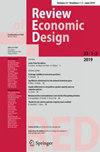传递:社会联系与间接互惠的实验研究
IF 0.5
4区 经济学
Q4 ECONOMICS
引用次数: 3
摘要
本文研究了群体内社会联系对群体外成员亲社会行为的影响。我们采用了一种间接投资游戏,在这种游戏中,善行的接受者必须返回给受益人,而不是最初的捐赠者。我们引入了捐赠人与受益人之间自然发生的社会联系,并表明当捐赠人的转移高于平均水平时,这种联系使受赠人向受益人的转移增加了42%。溢出效应不是通过捐赠者期望的信号发挥作用的,而具有内生参照群体的利他主义很好地解释了我们的结果。本文章由计算机程序翻译,如有差异,请以英文原文为准。
Paying it forward: an experimental study on social connections and indirect reciprocity
This paper studies how in-group social connections affect outsiders’ pro-social behavior towards group members. We employ an indirect investment game, in which a recipient of a good deed has to return to a beneficiary, instead of the original donor. We introduce the naturally-occurring social connections between the donor and the beneficiary, and show that such connections increase the recipients’ transfer to a beneficiary by 42% when the donor’s transfer is above average. The spillover does not function through the signaling of the donor’s expectations, and altruism with an endogenous reference group explains our results well.
求助全文
通过发布文献求助,成功后即可免费获取论文全文。
去求助
来源期刊

Review of Economic Design
ECONOMICS-
CiteScore
0.80
自引率
28.60%
发文量
37
期刊介绍:
Review of Economic Design comprises the creative art and science of inventing, analyzing and testing economic as well as social and political institutions and mechanisms aimed at achieving individual objectives and social goals. In this age of Economic Design, the accumulated traditions and wealth of knowledge in normative and positive economics and the strategic analysis of game theory are applied with novel ideas in the creative tasks of designing and assembling diverse legal-economic instruments. These include constitutions and other assignments of rights, mechanisms for allocation or regulation, tax and incentive schemes, contract forms, voting and other choice aggregation procedures, markets, auctions, organizational forms, such as partnerships, together with supporting membership and other property rights, and information systems. These designs, the methods of analysis used in their scrutiny, as well as the mathematical techniques and empirical knowledge they employ, along with comparative assessments of the performance of known economic systems and implemented designs, all of these form natural components of the subject matter of Economic Design.
Officially cited as: Rev Econ Design
 求助内容:
求助内容: 应助结果提醒方式:
应助结果提醒方式:


